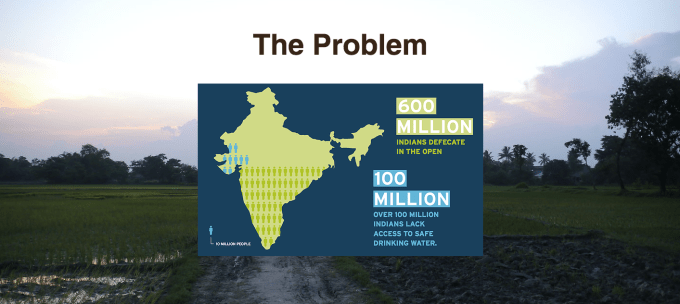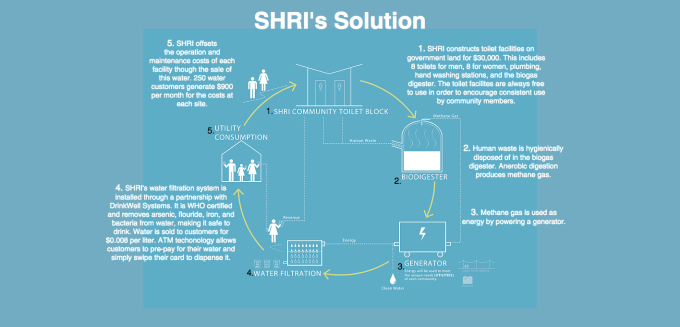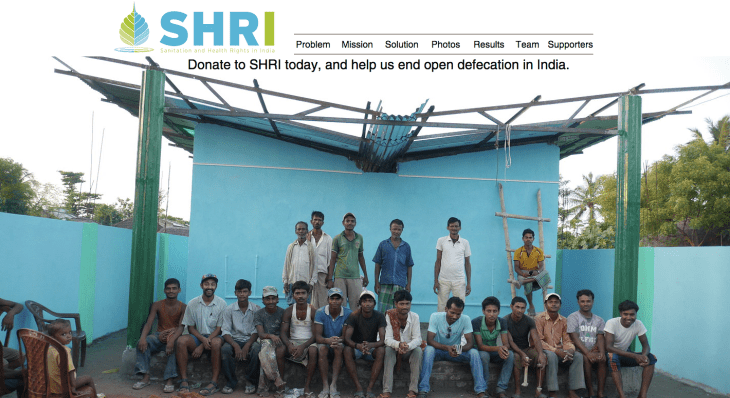In 2013 more than 340,000 children under the age of five died from diseases caused by a lack of safe water, sanitation and basic hygiene, according to a report by the United Nations International Children’s Emergency Fund.
In India, the problem is especially acute, with roughly 600 million citizens lacking access to basic sanitation services, and 100 million without clean water.
In health care circles the sanitation issue is called open defecation — it’s a serious problem that’s led to diarrhoeic diseases and malnutrition among children… and it’s a problem that a new non-profit, which launched yesterday in the latest Y Combinator batch, is looking to solve.
Sanitation and Health Rights in India is the fruit of work that 29-year-old Anoop Jain has struggled with for the better part of the last six years.
Ever since a trip to the Himalayas left Jain with an abiding sense of the profound transformations that could be wrought through non-profit work, the son of an oil man who claims New Orleans as his home has been working tirelessly for India’s rural poor.
His Himalayan excursion put him in contact with community activists from Behar, where he became convinced that he would do nutrition work there, akin to the soup kitchen he’d built for Tibetan refugees. But the burden of disease that stemmed from rural practices of open defecation was a much more serious problem for the communities in the country, Jain said.
“That’s when we decided we were going to focus on building toilets.”

It wasn’t always an easy road. “The first two years were spent figuring out what the hell we were doing,” says Jain. And how they were going to do it.
Now, after the months spent in Y Combinator’s boot camp, the company has rebranded with a new plan and a new sense of purpose to get its hybrid restrooms and water purification facilities into rural areas across India.
Y Combinator isn’t the first outside support that the company received, but it may be the most significant.
The first money into SHRI came in the form of a $30,000 grant in 2012 from the Dell Social Innovation Challenge. That money, coupled with donations from friends and family allowed the nascent non-profit that Jain had envisioned to buy its first parcel of land and buy the first of its public toilet blocks.
That first toilet is just the beginning. Located in Supaul, a community in the Northern Indian state of Behar, the public toilet opened in 2014. There are 2.2 million people who live in the district, and 200,000 in Supaul itself… and few modern toilet facilities.
“We work in rural areas because those are the areas where the problem of open defecation is most pronounced,” says Jain. “There are certain things we can prevent and we need to design our society in a way that mitigates the effect of these natural disasters and man-made disasters.”
A student of environmental engineering at Northwestern University, Jain had devised a novel system that not only would deal with the problem of public defecation, but also provide a way to pay for its upkeep.
The waste from the facilities is collected in a cement tank where it is converted to biogas. That biogas powers a water purification system located on the grounds of the facility. That water is sold for cents on the dollar to generate revenue to hire attendants to keep up the public toilets.

One year after completing the first public toilets in 2014, the non-profit built its second. Now Jain is looking to build as many toilets as quickly as possible.
“There are hundreds of millions of Indians who don’t have these services and who need them desparately,” says Jain. “We had been convinced by other non-profits who have been through the program that the lessons can be applied to non-profits to help them grow.”
To that end Y Combinator has been invaluable to the growth of a non-profit that could save the lives of hundreds of thousands of Indians.
Beyond Y Combinator’s training, SHRI can look forward to getting some cash from the incredibly deep pockets of the Indian government, which has committed $30 billion to end the problem of open defecation in India.
“We’re still, in the grand scheme of things, we’re pretty early with our work,” said Jain. “But for $100,000 we can improve access to waste facilities and clean drinking water for hundreds of thousands of people.”
